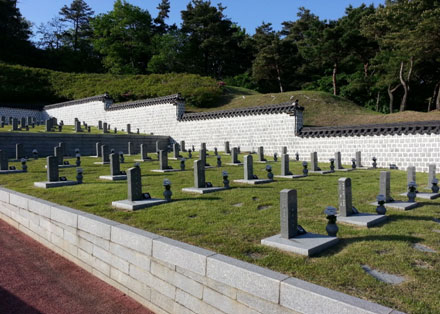Missing for 38 Years, We Must Remember Them

Lee Gi-bong, Secretary General of the May 18 Memorial Foundation, presented this paper during the regional conference on Enforced Disappearance held in Malaysia in August 2018. The conference was organized by CAGED-ENGAGE in partnership of May 18 Memorial Foundation.
Current State of the Missing from the May 18 Democratic Uprising
At the 10th Section of the May 18 National Cemetery in Gwangju, Korea, one can see the graves of missing persons. To be exact, those graves have only tombstones without burial mounds. They are of those whose ghosts were enshrined but not their bodies which are missing. And, this adds more pain to the hearts of their family members.
The 10th Section of the May 18 National Cemetery
The May 18 Democratic Uprising marks a special place in the history of the Korean Democratic Movement. In many aspects, the Uprising bisects this Movement, one before it and the other after it. The movement in the 70s was largely carried out by a small number of intellectuals, religious leaders, and college students until it turned out to be a people’s movement after the experience of the Gwangju Massacre and Struggles. This change was not only in the number and the range of participants but also in their attitude towards their struggles. Yes, the May 18 Uprising made an indelible mark in the history of Korea’s Democratic Movement. The root of the Democratic Movement of Korea in the 80’s was surely in Gwangju.
Victims during the Uprising consist 166 dead, 110 of whom died after being injured, 82 missing, and 3,559 wounded. Assaults, torture, and human rights violations committed to men and women still cause on-going pain.
The May 18 Missing refers to persons whose whereabouts are unknown or whose life or death state is left uncertain. Based on reports of family members, the count for the missing increases by 242. This means that 38 years on, 324 persons are still unaccounted for. Since some other missing persons may not have been reported, the actual number missing may be higher. Furthermore, only 76 among the missing were officially recognized with related documents/materials. Regrettably, most of the missing persons are not credited for being related to the May 18 Uprising.
We believe that there must be hundreds of missing persons besides the confirmed missing cases during the Uprising. To be officially registered as a missing person, one must at least have a family member who has informed the authorities of them as being a missing family member and this needs to be finally recognized by the authorities. Many beggars and persons without family members or friends disappeared during the May Uprising from Gwangju. No one knows their whereabouts or what happened to them. We think that the bodies of a considerable number of the victims were either secretly buried or abandoned somewhere. This is the reason that we have searched for secret burial sites and believe that through this we can solve the missing cases and we have not given up on it.
Most of the missing cases occurred during the early part of the Uprising. On May 20 or so many people suddenly disappeared. As many as 20 people disappeared on the 21st when the mass shooting occurred. On May 20, thirteen persons had disappeared. During the two days, 40% of the missing cases occurred.
The pain experienced is not restricted to the missing individual. The scar and shock caused by the sudden ‘missing’ in the spring of the year 1980 was immeasurable. The wounded heart that the families of the missing had to deal with was too deep to deal with. Some family members of the missing died of shock. The reason for such a death seemed to be because many of the missing persons were teens or children. Analyses reveal that their sense of guilt of not being able to protect their young eventually drove them to such a death.
What to Do to Solve Enforced Disappearances of May 18
‘Gwangju of May 1980’ has arrived here today against so many hardships and sufferings. After 38 years, Gwangju has now became ‘the Holy Land of Korea’s Democratization’ and not ‘the land of mobs’, but truth ascertainment trials were always foiled. In 1995, investigations of the December 12 Incident and the May 18 Democratic Uprising discovered that the New Military Power led by Chun Doo-hwan and Roh Tae-woo had commanded the Gwangju Massacre, and they were convicted by the supreme court, but none of the suspicions of secret burials of the victims, of who ordered the mass shooting at the Provincial Hall, and the issue of the missing persons were resolved. Some Commemoration Projects and recompenses were made to some degree, but the true settlement of the Uprising and unveiling its truth is still unfulfilled. It is our mission to accomplish this so as to pass on the truthful history of the May Uprising to future generations.The May 18 Democratic Uprising was the cornerstone for Korea to head towards democratization and has been considered to be the milestone of Korean democracy but the paradox of ‘victims without criminals’ has continued for 38 years. Rather, the victims now begin talking about forgiveness even before receiving any apologies. The cries of the families of the victims, “Disclose as clear as day who did what in May, 1980 in Gwangju. Only then we will decide what to do, either forgive or not” resonate in our heart.
The death toll of the May 18 Democratic Uprising is 352, if including the 110 dead because of the aftermath of injuries and the 76 missing persons to the 166 who died at the scene. Persons who had been punished for what they did during the Uprising totaled only 15, including Chun Doo-hwan. But both Chun Doo-hwan and Roh Tae-woo, who had been sentenced to life and 17 years imprisonment, respectively, were granted amnesty and reinstated in 1997.
So far what has been organized in order to unveil the truth of the May 18 Democratic Uprising were the parliamentary hearings (1988), prosecution investigations (1995), Defense Ministry Past Affairs Truth Unveiling Committee (2007), Past Affairs Truth and Reconciliation Settlement Committee (2010), and Defense Ministry Special Rapporteur (2018). They did bring in some attainments but could not reveal the core truth like who were responsible for the shootings. Bodies that had been presumed to be secretly buried had not been discovered, either. It turned out that the military records had been doctored and the military held fast to a lukewarm attitude towards investigations.
Last September, the 6th governmental investigation about the Uprising by the May 18 Truth Unveiling Special Committee began. Gwangju citizens see this as ‘the last chance to disclose the truth’. The Committee has a two-year term with one extension year. There were five governmental investigations about the Uprising but its entire truth is still vague. As witnesses and related materials are fading away, this is for sure the last opportunity.
Last May, a shocking fact was revealed for the first time. The fact that humanitarian crimes, including rapes of women committed by the Martial Law Army soldiers were rampant during the Uprising, was revealed after 38 years by some courageous women. The victims of sexual crimes, which were committed by the Martial Law Army soldiers and the Martial Law detectives, have led horrible lives since the last 38 years while being pushed to extreme states of mental disorder, home wreck, suicide, and death.
Most Martial Law Army soldiers, who know the truth about the May 18 Uprising, have been in silence for 38 years. In order to disclose the truth about helicopter shootings during the Uprising, the prosecution last year led an investigation of 40 pilots who had been dispatched to Gwangju during that time but only two of them participated. Also, no meaningful statement was attained, either. It was clear that the moral compulsion of the Martial Law Army soldiers was limited. And this is the reason that the May 18 Truth Unveiling Special Law provides that the Martial Law Army soldiers can be punishable. Also, there is a clause that any Martial Law Army soldier can be pardoned without assuming any legal responsibility for his doing, if he does confess the truth. The Martial Law Army should also realize that this is the last opportunity for them to be forgiven.
The wounds and aftereffects of this unfortunate history do not afflict only the victims. Yes, society as a whole is responsible for the unfortunate event, if its cause was because of the abuse of governmental authority. Since May 27, 1980 Korean society has tried to establish democracy through unveiling the May 18 truth and punishing those responsible and this is the reason that ‘the May 18 Uprising has not yet ended.’
Yes, it is the reality that after 38 years we are still in a situation of saying ‘the May 18 Uprising has not yet ended.’ We, though, have made some progress in establishing a legal and institutional system to set the unfortunate history committed by the governmental authority right and to prevent it from repeating in the future. If we do have democracy now as a result of it, it is time for us to face the pain of the victims who had sacrificed themselves for the cause and to take responsibility for them and their families. The ramification of one-way indemnification offered without any truth unveiling and punishing the responsible wasn’t small. It should also be noticed that damage to one person was not limited to that individual but rather greatly affected the whole family. The pain the family members had to endure was too deep for others to understand. Because of this reason, most victims’ families were unable to return to their normal lives.
This necessitates institutional strategies along with action in order to cure the social trauma. If an individual was wounded to the degree where he/she lost his/her identity and sociality in the vortex of history, means to heal the wounds must be provided. At the same time, it is important to prevent the individual wounds from being transferred to his/her family members.
As far as the members of families and society keep searching for the missing persons, it is not the past but the present. Many who had disappeared during the ‘May 18 Democratic Uprising’, the symbol of the Korea’s Democratic Movement, are still unaccounted for. Their families cannot even carry out their funeral and thus the life of the living is haunted by a funeral that has never taken place. As the ‘May 18 Democratic Uprising missing persons’ were the victims of democratization we who exist ‘here-now’ must carry out our ‘obligation of memory’. I would like to end this by quoting words from Han Kang’s novel – “Human Acts”.
After losing you, our time became dark.
Our house and alleyway became dark.
In the darkness that doesn’t become darker nor lighter
We eat, we walk, and we sleep.
Because we couldn’t have your funeral after your death,
My life became your funeral.
Our house and alleyway became dark.
In the darkness that doesn’t become darker nor lighter
We eat, we walk, and we sleep.
Because we couldn’t have your funeral after your death,
My life became your funeral.


